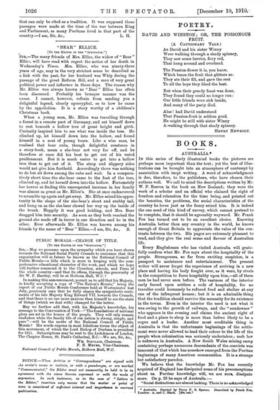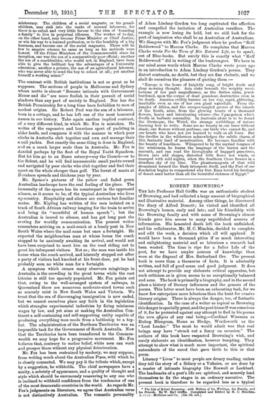BOOKS.
AUSTRALIA.* IN this series of finely illustrated books the pictures are perhaps more important than the text; yet the best of illus- trations can be brought into an atmosphere of contempt by association with inept writing. A word of acknowledgment is due, therefore, to the publishers, who have chosen their authors well. We call to mind the descriptions written by Mr. W. P. Reeves in the book on New Zealand ; they were the work of a scholar and an official who claimed the right of freedom and relaxation for the time being, and pointed out the beauties, the problems, the social characteristics of the country he loves just as the fancy seized him. It is indeed the one need of this kind of survey, which cannot pretend to be complete, that it should be agreeably wayward. Mr. Frank Fox has turned out to be an excellent choice. Knowing Australia better than any country in the world, he knows enough of Great Britain to appreciate the value of the con- trasts between the two. His pages are extremely pleasant to read, and they give the real sense and flavour of Australian life.
Every Englishman who has visited Australia will grate- fully confirm what Mr. Fox says about the hospitality of the people. Strangeness, so far from exciting suspicion, is a passport to assistance and entertainment. The present writer will never forget the experience of arriving in a new place and having his body fought over, as it were, by rivals in the competition to force hospitality upon him,—all of them men he had never seen before. The vastness of the interior early forced upon settlers a code of hospitality, for no traveller could humanely be refused food and shelter at any one of the infrequent houses ; but it is an admirable thing that the tradition should survive the necessity for its existence in the towns. Even in the interior the need is not what it was owing to the growth of railways, and the " sundowner " who appears in the evening and claims the ancient right of food and a place to sleep is more than before likely to be a rogue and a loafer. Another most creditable thing in Australia is that the unfortunate beginnings of the settle- ment were never allowed to lend their colour to the life of the people when colonisation was seriously undertaken; mob law is unknown in Australia. A New South Wales mining camp containing perhaps numerous descendants of the convicts was innocent of that which has somehow emerged from the Puritan beginnings of many American communities. It is a strange but satisfactory paradox.
We believe that the knowledge Mr. Fox has recently acquired of England has dissipated some of his preconceptions about us. Further knowledge will, we are sure, dissipate more. On p. 23 he says of Australia:— "Social distinctions are almost lacking. There is no acknowledged
• Australia. Painted by Percy F. S. Spence. Described by Prank For. London : A. and C. Black. Ms. net.1
aristocracy. The children of a social magnate, or his grand- children, may sink into the ranks of manual labourers, for there is no entail and very little favour to the idea of founding a family' to live in perpetual idleness. The worker of to-day, on the other hand, may become Prime Minister or Chief Justice, or win his way to a learned profession, or to the headship of a big business, and become one of the social magnates. There will be few to enquire whence he came as long as his methods were honest. Of the Prime Ministers of the Commonwealth since its inception, one was the son of a comparatively poor official ; another the son of a coachbuilder, who would not, in England, have been able to give the brilliant boy the advantages of a University education; another a printer, the son of an agricultural labourer, who was never able to send the boy to school at all ; yet another himself a working miner."
The contrast with British institutions is not so great as he supposes. The sections of people in Melbourne and Sydney whose motto is almost " Become intimate with Government House and die " are more foolish in their pursuit of social shadows than any part of society in England. Nor has the British Premiership for a long time been forbidden to men of modest origins. Sir Robert Peel was the son of a labourer, born in a cottage, and he has left one of the most honoured names in our history. Take again another implied contrast, of a very different kind, in which Mr. Fox is mistaken. He writes of the expensive and luxurious sport of yachting in older lands, and compares it with the manner in which poor clerks in Australia club together and own and manage their a mall yachts. But exactly the same thing is done in England, and on a much larger scale than in Australia. Mr. Fox is dazzled perhaps by the fleet of the Royal Yacht Squadron. But let him go to an Essex estuary—say the Crouch—or to the Solent, and he will find innumerable small yachts owned and navigated by poor clerks who club together and find their sport on the whole cheaper than golf. The forest of masts at Burnham spreads and thickens year by year.
Mr. Spence's pictures of the yellow and faded green Australian landscape have the real feeling of the place. The immensity of the spaces has its counterpart in the oppressed silence, as it seems to be, of the typical Australian who lives up-country. Hospitality and silence are curious but familiar mates. Mr. Kipling has written of the men isolated on a track of South African railway longing for the train to arrive and bring its "mouthful of human speech " ; but the Australian is inured to silence, and has got long past the craving for worldly communication. The present writer remembers arriving on a mail-coach at a lonely post in New South Wales where the mail came but once a fortnight. He expected the neighbourless man at whose house the coach stopped to be anxiously awaiting its arrival, and would not have been surprised to meet him on the road riding out to greet his infrequent visitors. Not so ; the man was inside his house when the coach arrived, and leisurely stepped out after a party of visitors had knocked at his front-door, yet he had probably seen no white man for a fortnight.
A symptom which causes many observers misgivings in Australia is the crowding in the great towns while the vast interior is still too sparsely populated. Mr. Fox points out that, owing to the well-arranged system of railways, in Queensland there are numerous moderate-sized towns such as scarcely exist in New South Wales and Victoria. We trust that the era of discouraging immigration is now ended, but we cannot ourselves place any faith in the legislation which strangles experimental industries by fixing minimum wages by law, and yet aims at making the Australian Con- tinent a self-containing and self-supporting entity capable of producing everything man needs from a battleship to a top- bat. The administration of the Northern Territories was an impossible task for the Government of South Australia. Now that the Territories have been transferred to the Common. wealth we may hope for a progressive movement. Mr. Fox believes that, contrary to earlier belief, white men can work and prosper there without any physical deterioration.
Mr. Fox has been restrained by modesty, we may suppose, from writing much about the Australian Press, with which he is closely connected. We may pay it the tribute which, except by a suggestion, he withholds. The chief newspapers have a sanity, a sobriety of appearance, and a quality of thought and style which should be enormously reassuring to any one who is inclined to withhold confidence from the tendencies of one of the most democratic countries in the world. As regards Mr.
Fox's judgments on literature, we agree that Australian verse is not distinctively Australian. The romantic personality
of Adam Lindsay Gordon too long captivated the affection and compelled the imitation of Australian versifiers. The example is now losing its hold, but we still look for the poet of inspiration who shall be an Australian of Australians. We disagree with Mr. Fox's judgment when he prefers "Rolf Boldrewood" to Marcus Clarke. He complains that Marcus Clarke wrote For the Term of His Natural Life, so to speak. out of Blue-books. But surely this is exactly what "Rolf Boldrewood " did in writing of the bushrangers. We have in our mind some words which Marcus Clarke wrote years ago in an introduction to Adam Lindsay Gordon's poems. They distort contrasts, no doubt, but they are fine rhetoric, and we shall do ourselves the pleasure of quoting them:—
"Europe is the home of knightly song, of bright deeds and clear morning thought. Asia sinks beneath the weighty recol- lections of her past magnificence, as the Suttee sinks, jewel- burdened, upon the corpse of dead grandeur, destructive even in its death. America swiftly hurries on her way, rapid, glittering, insatiable even as one of her own giant waterfalls. From the jungles of Africa, and the creeper-tangled groves of the islands of the South, arise, from the glowing hearts of a thousand flowers, heavy and intoxicating odours—the Upas-poison which dwells in barbaric sensuality. In Australia alone is to be found the Grotesque, the Weird, the strange scribblings of nature learning how to write. Some see no beauty in our trees without shade, our flowers without perfume, our birds who Cannot fly, and our beasts who have not yet learned to walk on all fours. But the dweller in the wilderness acknowledges the subtle charm of this fantastic land of monstrosities. He becomes familiar with the beauty of loneliness. Whispered to by the myriad tongues of the wilderness, he learns the language of the barren and the uncouth, and can read the hieroglyphs of haggard gum-trees, blown into odd shapes, distorted with fierce hot winds, or cramped with cold nights, when the Southern Cross freezes in a cloudless sky of icy blue. The phantasmagoria of that wild dreamland termed the Bush interprets itself, and the Poet of our desolation begins to comprehend why free Esau loved his heritage of desert sand better than all the bountiful richness of Egypt."



























































 Previous page
Previous page